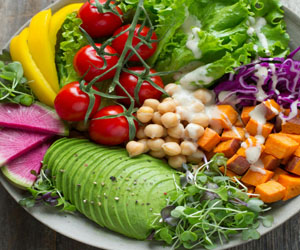


Fueling Performance And Recovery

For athletes and fitness enthusiasts, diet plays a critical role in achieving peak performance and maintaining overall well-being. Superfoods, a category of nutrient-dense foods packed with essential vitamins, minerals, and antioxidants, have become a popular choice to enhance athletic performance and support recovery. These remarkable foods provide the body with the necessary nutrients and energy to excel in sports and fitness pursuits.
Here's how superfoods can benefit athletes and fitness enthusiasts:
Quinoa: Known as the "mother of all grains," quinoa is a complete protein source. It contains all nine essential amino acids, making it an ideal choice for muscle recovery and growth. Quinoa is also rich in complex carbohydrates, providing sustained energy for workouts.
Berries: Blueberries, strawberries, and raspberries are packed with antioxidants, which combat oxidative stress induced by exercise. The antioxidants can help reduce muscle soreness and inflammation, accelerating recovery.
Salmon: Fatty fish like salmon are abundant in omega-3 fatty acids, which have anti-inflammatory properties. Omega-3s can reduce exercise-induced muscle damage and promote joint health, critical for athletes and fitness enthusiasts.
Spinach: Spinach is a leafy green powerhouse, offering a wide range of vitamins and minerals, including iron, which is essential for oxygen transport in the body. This is particularly important for endurance athletes.
Chia Seeds: Chia seeds are high in fiber, healthy fats, and plant-based protein. They provide long-lasting energy and can help maintain hydration due to their water-absorbing properties.
Bananas: These fruits are packed with potassium, an electrolyte crucial for muscle and nerve function. Eating a banana can help prevent cramps during or after intense workouts.
Sweet Potatoes: Sweet potatoes are a complex carbohydrate source that provides a sustained release of energy. They are rich in vitamins and minerals that support muscle recovery.
Nuts And Seeds: Almonds, walnuts, and pumpkin seeds are excellent sources of protein and healthy fats. They provide a quick energy boost and can be a convenient post-workout snack.
Greek Yogurt: Greek yogurt is high in protein and probiotics, which support muscle recovery and gut health. A healthy gut is crucial for nutrient absorption and overall well-being.
Turmeric: Curcumin, the active compound in turmeric, has anti-inflammatory properties. It can help alleviate exercise-induced inflammation and muscle soreness.
To maximize the benefits of superfoods in your athletic and fitness journey, it's important to incorporate them into a balanced diet that meets your individual needs and goals. It's also essential to stay hydrated, as water is vital for temperature regulation and overall performance.
Athletes and fitness enthusiasts should pay attention to pre-workout and post-workout nutrition. Consuming a combination of carbohydrates, protein, and healthy fats before exercise can provide energy and endurance, while a post-workout meal or snack should focus on muscle recovery and rehydration.
Superfoods offer a powerful arsenal of nutrients and energy sources that can elevate athletic performance and support recovery for fitness enthusiasts and athletes. By integrating these nutrient-dense foods into your diet, staying well-hydrated, and paying attention to timing and variety, you can fuel your workouts and achieve your fitness goals with greater success and overall well-being.
A Path To Emotional Strength
 Stress Reduction: Practicing gratitude can reduce stress by shifting the focus from worries and problems to positive aspects of life. This mental shift promotes relaxation and emotional balance, crucial elements in resilience.
Stress Reduction: Practicing gratitude can reduce stress by shifting the focus from worries and problems to positive aspects of life. This mental shift promotes relaxation and emotional balance, crucial elements in resilience.
Increased Social Support: Expressing gratitude often strengthens social connections. These supportive relationships provide individuals with a valuable safety net during challenging times.
Practical Steps For Building Resilience Through Gratitude
Keep A Gratitude Journal: Set aside time each day or week to write down the things you are grateful for. Reflect on both small and significant aspects of your life that bring you joy and fulfillment.
Express Gratitude: Make a habit of expressing your gratitude to others. Send a thank-you note or simply tell someone that you appreciate them. This practice not only benefits them but also reinforces your own sense of gratitude.
Mindful Moments: Incorporate gratitude into your daily routine by taking mindful moments to appreciate the present. Savor your morning coffee, the warmth of the sun, or the smile of a loved one.
Count Your Blessings: In challenging times, deliberately count your blessings. Reflect on the positive aspects of your life to maintain a sense of hope and optimism.
Develop A Gratitude Ritual: Create a daily or weekly gratitude ritual that allows you to reflect on and appreciate the good things in your life. This can be a private practice or one shared with loved ones.
The Benefits Of Building Resilience Through Gratitude
Enhanced Emotional Resilience: Gratitude helps individuals manage their emotional responses to adversity and maintain a positive mindset.
Nature's Pharmacy
 Diversity Of Plant-Based Natural Compounds
Diversity Of Plant-Based Natural Compounds
Plant-based natural compounds encompass an astonishing array of chemical compounds found in different parts of plants, including leaves, stems, roots, flowers, and seeds. These compounds include phytochemicals, flavonoids, terpenoids, alkaloids, polyphenols, and essential oils, to name a few. Each of these compounds carries unique properties that make them valuable for a wide range of applications.
Pharmaceutical And Medicinal Uses
Many pharmaceutical drugs owe their origins to plant-based natural compounds. For example, the pain-relieving properties of salicylic acid from willow bark led to the development of aspirin. Morphine, a potent painkiller, is derived from the opium poppy. Plant-based compounds are utilized in the treatment of various medical conditions, including hypertension, diabetes, and cancer. Their effectiveness often lies in their ability to interact with specific biological processes within the human body.
 3. Legumes And Pulses: Legumes, such as lentils, chickpeas, and beans, are excellent sources of plant-based protein, fiber, and essential vitamins. They make versatile and nutrient-rich additions to gluten-free meals, contributing to body nourishment.
3. Legumes And Pulses: Legumes, such as lentils, chickpeas, and beans, are excellent sources of plant-based protein, fiber, and essential vitamins. They make versatile and nutrient-rich additions to gluten-free meals, contributing to body nourishment.
4. Nutrient-Dense Snacks: Gluten-free snacking doesn't have to mean indulging in processed chips and sugary treats. Opt for nutrient-dense snacks like nuts, seeds, Greek yogurt, or gluten-free granola to keep your energy levels steady and nourish your body between meals.
5. Gluten-Free Baking: Gluten-free flours, like almond flour, coconut flour, and tapioca flour, can be used to make delicious baked goods. You can still enjoy muffins, pancakes, and cookies while nourishing your body and avoiding gluten.
6. Lean Proteins: Protein is vital for muscle health and overall well-being. Incorporate lean proteins like poultry, fish, tofu, and legumes into your diet to ensure that your body receives the necessary amino acids.
7. Dairy Or Dairy Alternatives: Dairy products like milk, cheese, and yogurt (if tolerated) provide calcium and protein. If you're lactose intolerant or choose to avoid dairy, there are various dairy alternatives available, such as almond milk or coconut yogurt.
8. Micronutrients: Pay attention to getting a variety of micronutrients in your gluten-free diet. Vitamins and minerals are crucial for overall health. Make sure your meals include a spectrum of colorful fruits and vegetables to maximize the diversity of nutrients your body receives.
9. Hydration: Proper body nourishment includes staying well-hydrated. Water is essential for digestion, circulation, and overall health. It's gluten-free and a fundamental part of maintaining your well-being.






A Comparative Exploration
 Here are some of their defining characteristics:
Here are some of their defining characteristics:
Cultural Significance: Traditional herbal remedies carry cultural significance and are often closely tied to the identity and heritage of specific communities. They reflect the wisdom and experience of generations past.
Holistic Approach: Traditional remedies often take a holistic approach, considering not only physical symptoms but also emotional and spiritual aspects of well-being. They emphasize the interconnectedness of body, mind, and spirit.
Time-Tested: Traditional remedies have withstood the test of time, proving their efficacy over centuries of use. Their long history speaks to their value and reliability.
Plant Synergy: Traditional remedies often use whole plants or plant parts, believing that the synergy of various compounds within the plant is key to their therapeutic effect.
Modern Herbal Remedies
Modern herbal remedies, on the other hand, represent a more recent evolution of herbal medicine. They integrate traditional knowledge with modern scientific understanding and technology. Here are some key aspects of modern herbal remedies:
Scientific Validation: Modern herbal remedies benefit from extensive scientific research and clinical studies. They undergo rigorous testing to confirm their efficacy and safety.
Standardization: Modern herbal remedies often involve the extraction and standardization of active compounds. This ensures consistent dosages and reliable results.
Integration With Conventional Medicine: Modern herbal remedies are frequently used alongside conventional medical treatments in integrative medicine. This approach offers patients a broader range of therapeutic options.
Nourishing The Body, Mind, And Spirit
 Digestive Health: A healthy gut is a cornerstone of holistic health. Superfoods like yogurt with probiotics, chia seeds, and fermented foods support a balanced gut microbiome. A well-functioning digestive system is not only essential for physical health but also for mental well-being.
Digestive Health: A healthy gut is a cornerstone of holistic health. Superfoods like yogurt with probiotics, chia seeds, and fermented foods support a balanced gut microbiome. A well-functioning digestive system is not only essential for physical health but also for mental well-being.
Energy And Vitality: Superfoods are often excellent sources of complex carbohydrates, healthy fats, and plant-based protein. These macronutrients provide the body with energy, promoting vitality and endurance for daily activities and exercise. Having the energy to enjoy life to the fullest is a vital aspect of holistic health.
Mental Clarity And Mood: The nutrients in superfoods can positively influence brain health. Omega-3 fatty acids found in fatty fish, for example, have been linked to improved cognitive function and mood regulation. A clear mind and balanced mood are integral to holistic health.
Heart Health: Superfoods like nuts, berries, and fatty fish are known for their heart-protective properties. A healthy heart ensures optimal blood circulation, reducing the risk of cardiovascular issues and supporting overall vitality.
Emotional And Psychological Well-Being: The impact of diet on mental health is increasingly recognized. Superfoods, particularly those rich in antioxidants and essential nutrients, can contribute to emotional well-being by reducing stress, anxiety, and depressive symptoms.
Spiritual Nourishment: In holistic health, nourishing the spirit is just as important as nourishing the body and mind. Some superfoods like green tea and matcha, used in meditation practices, offer a sense of calm and spiritual connection.
Environmental And Ethical Considerations: Superfoods can be part of a holistic approach by supporting sustainable and ethical food choices. Choosing locally sourced, organic, and ethically produced superfoods aligns with the holistic principle of interconnectedness with the environment and community.